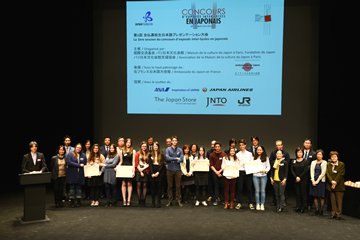2017 Japanese-Language Assistants’ Report: Activity Report
The Japan Cultural Institute in Paris
TSUDA Kaori

Exterior of the Japan Cultural Institute in Paris
The Japan Cultural Institute in Paris (French name: Maison de la culture du Japon à Paris; hereafter referred to as "MCJP"), where I have been dispatched as a Japanese-Language Assistant since June 2016, is located on Quai Branly, facing the Seine River, near the Eiffel Tower. Since its opening in 1997, MCJP has been introducing Japanese culture to France through various programs such as performances, exhibitions, films, and cultural experience classes. The Japanese-Language Department, to which I belong, conducts training related to Japanese-language education, organizes events related to Japanese-language learning and education, conducts JF Japanese-language courses, and cooperates with external organizations, with "Japanese language" as the keyword.
As an example of the work that I myself was involved in, I would like to introduce the "All-France High School Japanese Presentation Competition." This was a new project that was held for the first time this year, and the planner, FUJIMITSU Yuko, a Japanese-language chief advisor (Japanese-Language Senior Specialist), was the main person in charge of creating the project, reviewing and discussing each step, one by one. It is also a deeply memorable experience to me because I was involved in the entire process of the project. In this competition, high school students studying Japanese all over France select one person who fits the theme of the competition, "Japanese-French exchange, check out this person!", and then give ten-minute presentations in Japanese in two to three person teams. Applicants must submit an entry sheet and a video, and the five teams that pass the preliminary screening will participate in the finals. With support from MCJP, the finalists will prepare their presentations with free ideas, and will present them on the big stage on the day of the competition.
From the time I accepted the applications, I was exchanging emails with high school students and teachers and realizing that they had great enthusiasm for the competition and overcame difficulties as they approached it. Since they were preparing for the competition as well as participating in their usual school activities during the day, they were often sending us emails in the middle of the night, and I also heard that they even got together during their vacations to work on the project. We did our best to support them in their efforts. With the full cooperation of the MCJP library, we introduced online search tools and resources to our students so that they could access reliable information wherever they were, and made sure to return personalized comments on each of their submissions. In order to avoid misunderstandings in the students' understanding, we tried to create documents in both Japanese and French.
In the final round, all the teams gave more in-depth and engaging presentations than in the preliminary screening. Their creativity and ability to take action often exceeded our expectations. They incorporated things like theatrical performances and shadow puppets into their presentations to devise ways to communicate to the audience, visited libraries and French-Japanese organizations in various towns to collect materials on their own, and interviewed many people. I could see that everyone on the teams had cooperated with each other to create their projects with the help of their teachers. The students looked like they had a real sense of accomplishment when they finished their presentations and we were very happy to see the results of their efforts. We received a lot of praise for them from the visitors.
After the competition is over, we follow up with the students and teachers who gave the presentations to ask them to reflect on what they learned through their participation in the competition, so that their learning can be organized and deepened. We, the organizers, are also reflecting on the competition and starting to prepare for the second one. What we are discussing now is a better way to evaluate the presentations of students with Japanese roots and those who started learning Japanese as a foreign language in high school on the same basis. There is some discussion about assessing the quality of critical thinking and preparation processes along with linguistic performance. After the competition, I had a chance to think about the design of learning with graduate students studying Japanese-language education, using this competition as a model, and I was able to hear their opinions on the issue of evaluation. Discussing what we should and can do in order to ensure equal opportunities for all people, regardless of origin, is positive and hopeful, and I am very proud to be a part of such discussions.

All-France High School Japanese Presentation Competition
In this way, I am greatly motivated every day at my workplace, where I am able to work with many different people in order to achieve great goals in the area of Japanese language. My own term of office is two years in total, and I have about one year left. In the remaining year, I would like to make use of what I have learned so far, as well as my own expertise (linguistics, especially in the field of French-Japanese language contrast studies), to contribute to the Japanese-language education in France.
Reference link:
The 1st All-France High School Japanese Presentation Competition
- What We Do Top
- Arts and Cultural Exchange [Culture]
- Japanese-Language Education Overseas [Language]
- Japanese-Language Education Overseas [Language] Top
- Learn Japanese-language
- Teach Japanese-language
- Take Japanese-Language Test
- Know about Japanese-language education abroad
- The Japanese-Language Institute, Urawa
- The Japanese-Language Institute, Kansai
- Japanese-Language Programs for Foreign Specified Skilled Worker Candidates
- Japanese Language Education for Japanese Children Resident Overseas and for the Descendants of Migrants
- Archives
- Japanese Studies and Global Partnerships [Dialogue]
- JF digital collection
- Other Programs / Programs to Commemorate Exchange Year
- Awards and Prizes
- Publications
